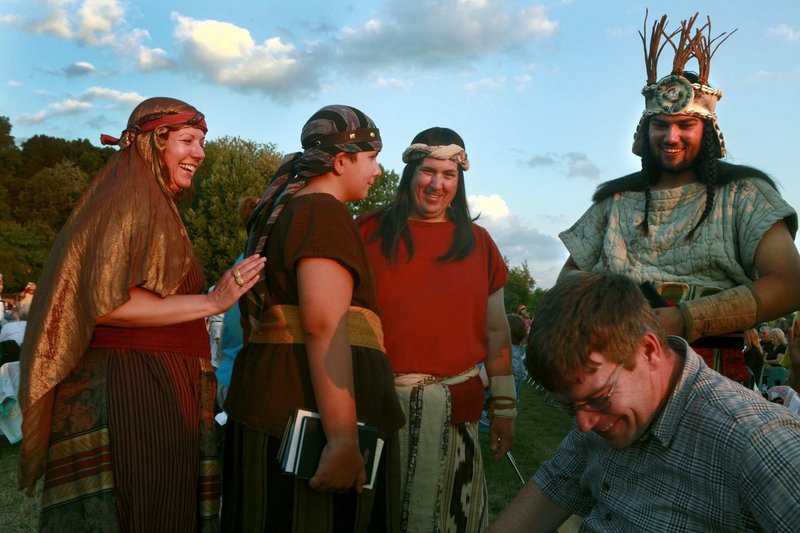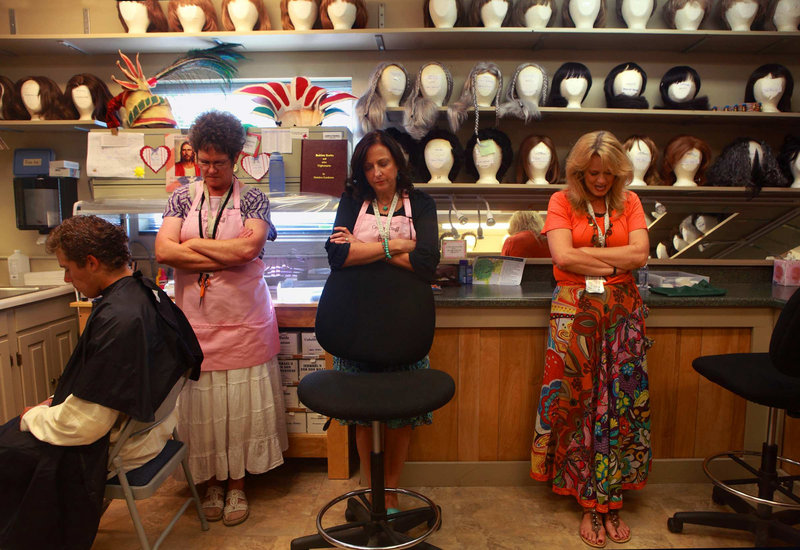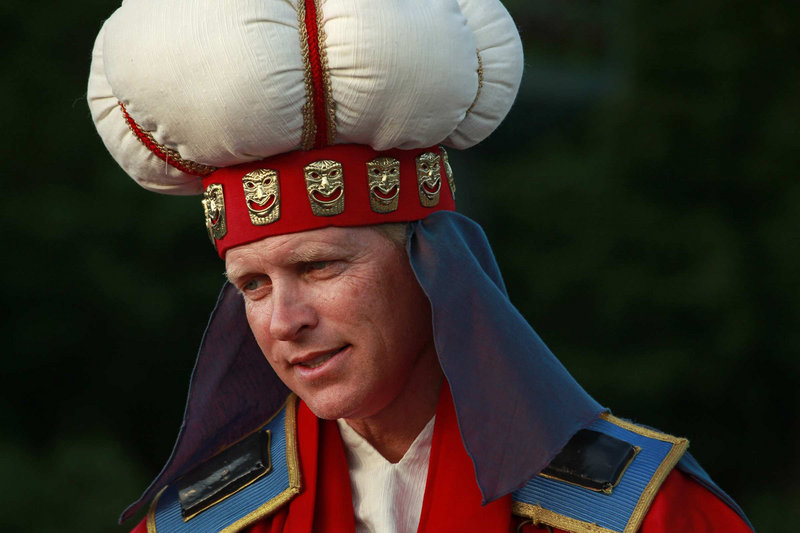PALMYRA, N.Y. – Don and Lee Preston, who teach at an international school near Shanghai, were sitting under a gaily striped tent on a recent Saturday in a field near the birthplace of the Mormon prophet Joseph Smith, helping entertain a group of Mormon teenagers.
The Prestons could have gone home to Arizona for their vacation, “but we wanted to do something more meaningful with our summer than eating in restaurants and seeing movies,” said Lee, 43.
So they packed up their three teenagers and flew to upstate New York instead. Along with hundreds of other Mormon families, they would spend a couple of weeks here in a glorified summer theater camp, talking about Scripture by day and performing it by night.
By nightfall that Saturday, the Prestons and their children — Alynne, 18, Emma, 16, and John, 14 — had changed from T-shirts and shorts into elaborate costumes of a lost tribe of Israel. Don was still getting used to his long, straight wig, which he said had a Cher vibe going. After posing for family pictures, they joined 700 other bearded, bewigged and bejeweled volunteers on a massive, seven-tier outdoor stage to perform in the annual Hill Cumorah Pageant, a celebration of the Mormon faith that more than one of its adult actors described as a “bucket list” experience.
For more than an hour, amid explosions, waterfalls, fiery deaths and a Christ in glowing white robes who floats to stage from a heavenly height, the Prestons and their brethren helped bring to life the stories told in the Book of Mormon.
“Plato listed spectacle as one of the basic elements of drama, and we certainly cash in on that,” said pageant artistic director Brent Hanson, a theater professor at Utah’s Dixie State College, who like all pageant staff is a volunteer.
This seems to be a propitious moment for Mormonism, a uniquely American faith beset by misconceptions, many stemming from its polygamous roots and an enduring suspicion among some Christians that Mormons are not really Christian. (The Church of Jesus Christ of Latter-day Saints officially disavowed plural marriage more than a century ago; the practice endures among fundamentalist breakaway sects.)
In mid-June, the LDS Church unveiled a rebranding campaign in New York City aimed at countering negative associations that came up in focus groups. Featuring smiling Mormon faces on taxis and the electronic billboards of Times Square and the slogan “I’m a Mormon,” the campaign, which directs people to an LDS website, Mormon.org, is slated to expand to other cities in the fall.
And the Broadway musical hit “The Book of Mormon” is reeling in audiences and money. Though some Mormons have taken offense at the show, which pokes ironic fun at the religious zeal of two missionaries sent to a Ugandan village plagued by AIDS and a violent warlord, some Mormons here said they welcomed the attention.
While “The Book of Mormon” patrons have to empty their piggy banks, fans of the real Book of Mormon don’t have to pony up a cent. They don’t even pay for parking.
“This is the antithesis of Disney World,” said Kingsley Allan, 46, a scientist at the University of Illinois at Urbana-Champaign, who greeted arrivals last weekend in a gray wig and rustic skirt with his 13-year-old son, Stewart, also in costume. “Disney World is all gimme, gimme, gimme. This is about them giving back.”
The annual extravaganza, which began in 1937, is overseen by the missionary department of the church headquarters in Salt Lake City. The actors fan out into the audience before and after the show with pamphlets and copies of the Book of Mormon, eager to talk about their faith.
The pageant is an enormous logistical undertaking with a short lead time. After applying online between the previous August and November, selected participants arrive in Palmyra. They are cast based on appearance alone, since the soundtrack is prerecorded by professional actors with singing by the Mormon Tabernacle Choir.
After a week of rehearsal, the show runs for seven days.
The stage is set into the hillside — the hill is called Cumorah — exactly where Smith claimed to have found the metal tablets written in what he called “reformed Egyptian” in the 1820s that he translated into the Book of Mormon and used to found the faith.
“We believe it’s an ancient book of scriptures that God spoke to prophets in ancient America just like he did in the Bible in the Holy Land. God used Joseph Smith as his frontman to make that happen,” said Hanson, the artistic director.
Copy the Story Link
Send questions/comments to the editors.





Success. Please wait for the page to reload. If the page does not reload within 5 seconds, please refresh the page.
Enter your email and password to access comments.
Hi, to comment on stories you must . This profile is in addition to your subscription and website login.
Already have a commenting profile? .
Invalid username/password.
Please check your email to confirm and complete your registration.
Only subscribers are eligible to post comments. Please subscribe or login first for digital access. Here’s why.
Use the form below to reset your password. When you've submitted your account email, we will send an email with a reset code.